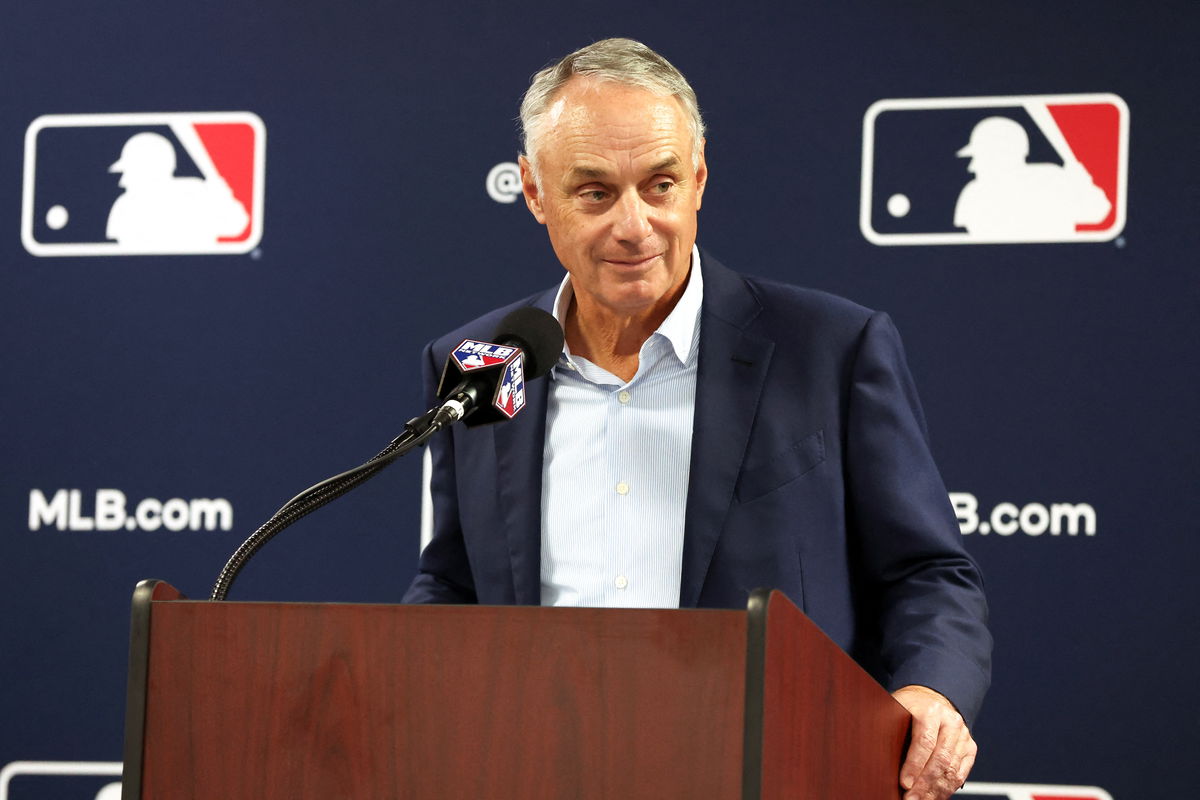
USA Today via Reuters
Feb 15, 2024; Tampa, FL, USA; MLB commissioner Rob Manfred talks with media at George M. Steinbrenner Field. Mandatory Credit: Kim Klement Neitzel-USA TODAY Sports

USA Today via Reuters
Feb 15, 2024; Tampa, FL, USA; MLB commissioner Rob Manfred talks with media at George M. Steinbrenner Field. Mandatory Credit: Kim Klement Neitzel-USA TODAY Sports
MLB is once again proving that no offseason storyline hits quite like a looming labor war. The league, which can market Shohei Ohtani but can’t settle on how to pay his peers, has entered spin mode. With Rob Manfred trading negotiation for narration and players left to decode the fine print, the sport might soon be swinging at fastballs no one agreed to throw.
Watch What’s Trending Now!
The tension between the MLB Players Union and MLB is rising again, and it might get ugly this time. The current CBA runs out at the end of 2026, and the rumors are that the negotiations will start in mid-2025. But the fear is that if there is no agreement, just like in 2022, there will be a lockout, and there will not be any games for a few weeks. With the fear of that, Manfred made some statements, and union head Tony Clark had a few words of his own on that.
In his recent interview, Manfred said that the MLB Players Union is not letting the players know what is happening, and there is a miscommunication. He also said that the current leadership is not leading the way for a change, and said that 10% of the players earn around 72% of the money. After this, Tony Clark said, “MLB’s sales pitch, full of misleading or downright false statements, is coupled with their already announced intention to shut down the sport unless they get their way.”
ADVERTISEMENT
Manfred has launched a direct campaign to reshape how players view baseball’s economic structure. By holding annual team meetings, he questions current systems and proposes revenue-sharing models used in other sports. He argues players have lost billions by resisting a 50-50 revenue split with owners. His rhetoric suggests reform is necessary, though it also conveniently aligns with the owners’ financial interests.
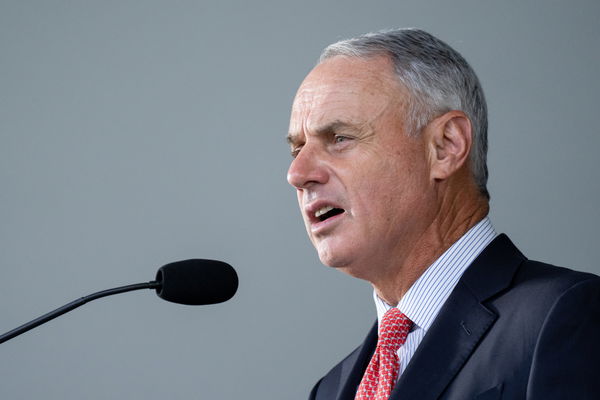
ADVERTISEMENT
These proposed changes may boost franchise value, but don’t guarantee better outcomes for everyday players. Salary distribution remains heavily skewed, with 10% of players earning most of the game’s total payroll. Critics argue these reforms prioritize long-term profits over current compensation and player flexibility. Without balanced input, reforms risk serving the business more than the athletes who power it.
ADVERTISEMENT
For lasting change, MLB and the Players Association must return to the table with shared purpose. Collaborative bargaining ensures reforms don’t merely reflect boardroom goals but also player well-being and game integrity. Both sides must address trust gaps widened by past negotiations and current accusations. Baseball thrives when both labor and leadership move forward—together, not in separate dugouts.
If MLB can sell a dream in Shohei Ohtani, it can’t keep selling nightmares to the rest of its workforce. The league wants reform, but only on its own terms—terms that seem to rhyme suspiciously with “salary cap.” Manfred may call it vision; players might call it spin. One thing’s certain: if both sides don’t get the same terms soon, baseball’s next pitch might be thrown in a boardroom, not a ballpark.
ADVERTISEMENT
MLB Players Association drawn into a federal probe
When billion-dollar empires collide with bureaucracy, someone’s always left holding the subpoena. Major League Baseball and its Players Association have rarely seen eye to eye on contracts, on rules, on just about everything short of the stitching on a baseball. Now, in a twist worthy of a CBA footnote, the MLBPA finds itself under a different kind of spotlight—one cast not by stadium lights, but by federal investigators.
Federal investigators have launched a probe into OneTeam Partners, a licensing firm tied to athletes. The FBI and the Department of Labor are focusing on financial structures and money flow. In 2024, OneTeam paid the MLBPA a reported $44.5 million. While players were interviewed, they were not considered targets in the ongoing investigation.
Top Stories
Framber Valdez Hit With Harsh Reality Check as Orioles, Blue Jays Lock Horns In Heated Battle

“Greedy” Phillies’ Bo Bichette Miss Continues to Haunt as Dave Dombrowski Draws Blunt Criticism

Brian Cashman Distances Himself from Yankees’ Offseason Outcome with $162M Hal Steinbrenner Verdict
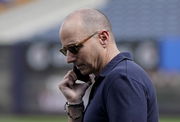
Aaron Boone Clears Stance on Risking Yankees Future for Aaron Judge’s Personal Milestone
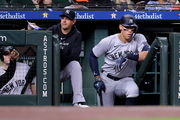
Max Scherzer’s “Unfinished Business” Sends Clear Signal to Blue Jays After Honest Plea to All 30 MLB Teams
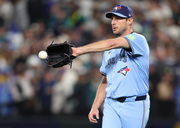
The MLBPA is tied in through its leadership role and financial entanglement with OneTeam’s operations. Tony Clark, the MLBPA head, sits on OneTeam’s board alongside NFLPA chief Lloyd Howell. The firm was co-founded by Clark and ex-NFLPA leader DeMaurice Smith in 2019. Its meteoric rise into a multibillion-dollar entity has now triggered federal curiosity.
ADVERTISEMENT
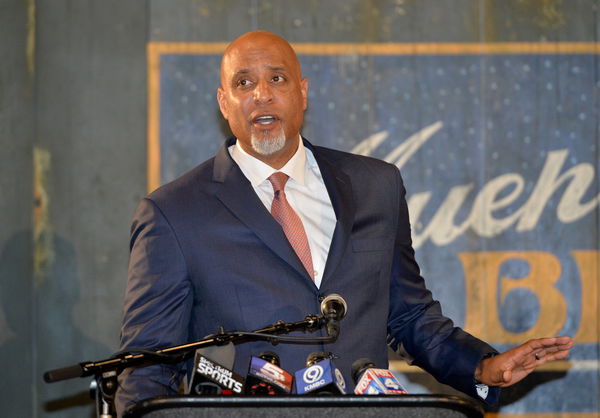
ADVERTISEMENT
If wrongdoing is found, the MLBPA could face intense scrutiny and legal consequences. Misreporting, conflicts of interest, or misallocated funds could erode union credibility. It could also strain already tense MLB–MLBPA relations, with trust hanging by a thread. Cooperation now seems mandatory—damage control may soon be necessary.
For a union that’s spent decades battling owners over transparency and fairness, finding itself under the microscope is rich with irony. The MLBPA has long demanded accountability—now it may have to provide it. In baseball, they say every error gets recorded. This one might take a few subpoenas to score.
ADVERTISEMENT
ADVERTISEMENT
ADVERTISEMENT
ADVERTISEMENT